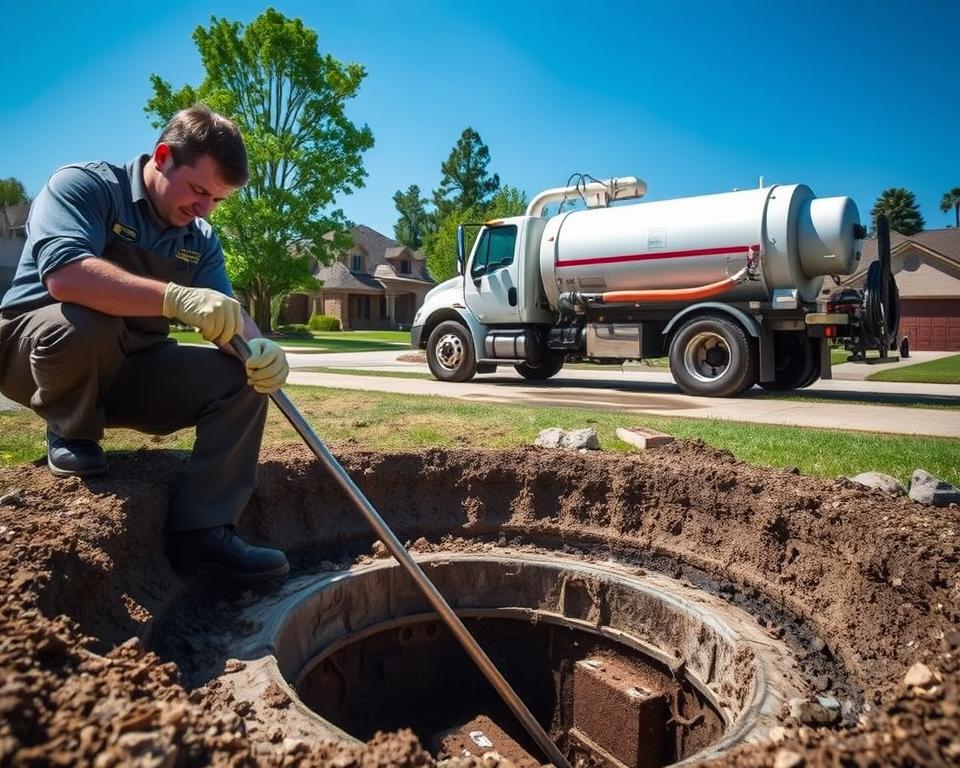Sustain Septic System Cleaning for Tank Health
Ever wondered about the effects of ignoring septic system care? For those who use these installations for wastewater treatment, skipping regular care can lead to hefty expenses. It also creates hazards to both public safety and the ecosystem. Cleaning your septic system isn’t just a basic task; it’s vital for making sure your home operates smoothly. By routinely emptying your septic tank, you prevent sediment accumulation and prolong the longevity of your unit. This proactive stance helps you sidestep any unwanted scenarios. Discover the significance of septic tank upkeep and the methods required with septic tank cleaning companies.
Major Insights
- Regular septic system servicing is vital for preventing costly fixes.
- Ignoring upkeep can cause dangerous conditions for your loved ones.
- Knowing your septic system helps in efficient maintenance.
- Indicators of a troubled septic system should be recognized quickly.
- Professional services can help in keeping peak tank health.
Comprehending Your Septic System
A septic system is an economical in‑situ method for processing wastewater. It mainly consists of two components: the septic tank and the drainfield. Both are integral for providing safe treatment and safeguarding the ecosystem.
The septic tank gathers wastewater from your home. Inside,, waste solids sink to the floor, and effluent rise to the surface. Bacteria within the tank decompose the organics, making the outflow easier to process. This pre‑treated wastewater then moves to the drainfield for further purification by the soil, concluding the cleanup.
It’s crucial for homeowners to understand the mechanics of their septic system. Learning how the septic tank and drainfield operate in tandem can lead to improved system care. This knowledge supports effective maintenance practices, supporting the system’s durability.

Value of Regular Septic System Cleaning
Routine servicing of the septic system is key for household and ecological health. If ignored, untreated wastewater can spill into your yard. This spillage may result in well water contamination, creating dangerous conditions. By keeping the septic system clean, you protect your family and the ecosystem.
It’s recommended to service the septic system every three‑to‑five years, based on how much you load it. Such care is not just eco‑friendly; it avoids costly fixes. A septic system that’s well‑maintained works more efficiently, ensuring a safer living space and a safer natural world.
Indicators Your Septic Tank Needs Cleaning
Homeowners need to spot signals that their septic tank may need pumping. Key signals to monitor include:
- Delayed draining in basins, showers, and toilets
- Foul odors near the drainfield
- Sewage backups in interior drains
- Persistent damp zones or lush patches of grass over the septic system
It’s critical to identify these warnings quickly to prevent significant septic tank problems. Routine inspections are essential. They help spot issues before they escalate to expensive repairs. Inspecting your system regularly guarantees it works well and survives longer.
Staying alert and responding quickly are crucial for septic system care. By paying close attention to these red flags, you can maintain your septic system in optimal health.
Septic System Cleaning Frequency
Pumping your septic system on schedule is key to maintaining your home’s plumbing in excellent condition. Experts usually recommend servicing the septic tank every three‑to‑five years. However, this can differ depending on the capacity of your home, how much water you use, and the capacity of your tank.
If you have a big household that consumes more water, you might need to clean the system more often. Tracking your water consumption can let you determine if you need to modify your pumping schedule.
All in Sanitation encourages setting up a reliable pumping schedule that suits your household’s specific needs. Sticking to a set maintenance program maintains your septic system functioning effectively and prevents hefty restorations.
Septic System Cleaning: Best Practices
For a septic system to stay robust, homeowners must observe crucial habits. It’s essential not to flush non‑biodegradable items; doing so stops obstructions and ensures the system working well. Similarly, minimizing household chemical usage helps maintain the essential bacterial balance. These measures are critical for the system’s life span and performance.
Proactivity with regular inspections is key. Setting up periodic checks can catch issues early, enabling prompt fixes. Additionally, conserving water through fixing leaks and careful usage supports septic tank health. These practices ensure the system functions efficiently for years.
It’s also essential not to drive on the leachfield. Maintaining this area unobstructed allows it adequately handle waste water, shielding your system from harm. Heeding advice from professionals like All in Sanitation also enhances septic system care.
The Steps of Septic Tank Pumping
For homeowners, grasping the septic system cleaning process is crucial. A licensed septic pumper should perform routine septic tank pumping to maintain your system operating properly. The first step is checking the tank’s state to determine when it needs pumping.
A septic tank demands pumping once the solid layer fill about a third to half of its volume. The licensed septic pumper will then remove these accumulations. This step maintains the system’s efficiency. Furthermore, the service may involve inspecting the tank for potential issues, facilitating prompt fixes.
Keeping a record of each pumping visit is advisable. This log helps homeowners keep tabs on their septic system’s upkeep, and is useful if listing the property. Adequate septic system maintenance extends its longevity and performance, preventing hefty fixes later on.
Septic Tank Check‑Up: What to Examine
Regular inspections are vital for your septic system’s health. Using a detailed septic tank inspection checklist can uncover potential issues promptly. Inspections should be carried out by a licensed contractor every one to two years. They will gauge sludge levels and the floating layer during this visit.
Inspecting the inlet and outlet baffles and effluent filters is also important. These elements are essential for your septic system’s efficient operation. Detecting seepage or malfunctions quickly can prevent steep repair costs. Proactive steps, like using an inspection checklist, boost your system’s durability and performance.
Expert Septic System Services
Utilizing expert septic system services is essential for your septic system’s health. By partnering with a company like All in Sanitation, you make sure that qualified professionals manage the pumping, check‑ups, and repairs thoroughly. Certified experts have specialized knowledge, helping homeowners to sustain the system’s peak functionality for decades.
Maintenance by certified technicians cuts the chance of surprise breakdowns and expensive repairs. These services include comprehensive inspections that check the system’s state, identifying possible issues promptly. Maintaining this forward‑looking posture substantially lengthens your septic system’s service years.
Ultimately, entrusting your septic system to certified pros offers confidence. Working alongside companies such as All in Sanitation taps into their expertise. It ensures the wellbeing of your tank, creating assurance in its maintenance.
Septic System Maintenance Advice for Homeowners
Homeowners have the capacity to ensure their septic systems operating reliably. Following effective care strategies significantly enhances their function. Implementing simple changes to water habits, like cutting down on unnecessary use and staggering the use of appliances, lessens load on the system.
Adding low‑flow fixtures in your restrooms and galleys greatly bolsters septic durability. These fixtures decrease water use without sacrificing performance. Skipping garbage disposals is wise too, as they lead to more solids in the system, requiring extra upkeep.
Routine inspections and sticking to a proper maintenance plan will prolong your septic system’s life. Paying attention of everything that flows into your drains is crucial for keeping a balanced septic environment. By embracing these habits, you’ll greatly boost your septic system’s performance and lifespan.
Common Septic System Repairs
Septic systems may face various problems over time, calling for repairs. Common faults are fluid loss, faulty baffles, and drainage issues in the drainfield. By recognizing the symptoms early, homeowners can address them swiftly, maintaining their system remains in sound condition.
Usual repairs include:
- Replacing faulty components to bring back system integrity
- Repairing or changing cracked conduits to stop leaks
- Removing obstructions from plugged lines to maintain proper drainage
Handling septic troubles promptly not only reduces costs over time but also lengthens the system’s life. Scheduled check‑ups and maintenance can ward off these issues, aiding in the upkeep of a healthy septic system.
In Closing
Preserving your septic system healthy is critical to environmental and household well‑being. Routine pumpings and inspections avoid hefty bills and hazards. Taking initiative with septic care protects time and lowers concern.
Using experts like All in Sanitation delivers first‑class upkeep suited to your requirements. Their experience assists spot issues promptly, avoiding serious troubles and underscoring the need for routine inspections.
Adopting effective habits for septic maintenance delivers long‑term system efficiency. A little maintenance today secures a healthier septic system in the long run.

